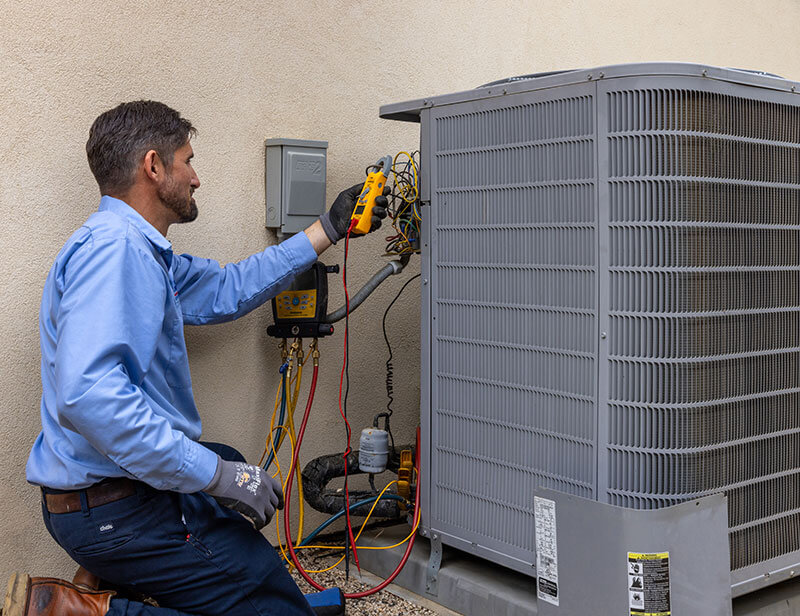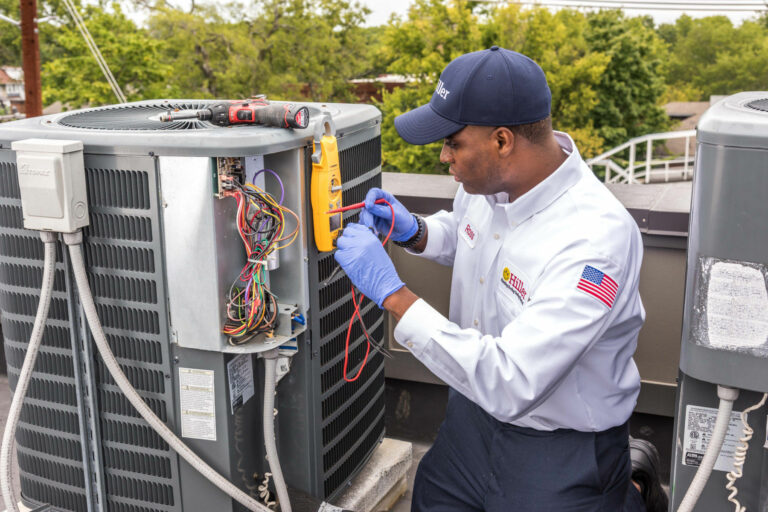Choosing In Between a Heatpump and Heating System: Secret Considerations for Your Heating And Cooling Needs
When evaluating home heating alternatives for HVAC needs, the choice in between a warmth pump and a heater can be intricate. Each system uses distinct benefits tailored to details environments and energy performance goals. Understanding these distinctions is important for making an enlightened option. Key aspects such as setup prices and environmental influence even more make complex the choice procedure. Which choice really straightens with one's comfort and sustainability choices? The complying with areas will check out these factors to consider carefully.
Comprehending Heat Pumps: Just How They Function and Their Benefits
While numerous home owners consider different home heating options, recognizing how heat pumps feature and their benefits can greatly affect their decision. Warm pumps operate by moving warm instead of generating it. In the winter, they draw out warm from the outdoors air or ground and transfer it indoors, while in the summer season, they reverse this process, cooling the home by eliminating heat outside. This twin performance makes them versatile for year-round environment control.One of the main benefits of warmth pumps is their power efficiency. They utilize significantly less electrical power compared to traditional furnace, possibly causing lower utility bills (heat pump installation ooltewah tn). Additionally, heat pumps have a smaller carbon footprint, making them an environmentally friendly choice. They also need less maintenance than conventional systems, adding to long-lasting expense financial savings. Overall, understanding the auto mechanics and benefits of heatpump can aid homeowners make notified decisions concerning their home heating and cooling needs
Checking Out Heaters: Kinds, Operation, and Advantages
Furnaces come in various kinds, consisting of gas, electric, and oil models, each with distinctive functional systems. Understanding these differences is vital, as they influence performance and home heating performance. Additionally, heaters supply countless advantages, such as constant warm output and reliability in colder environments.
Sorts of Heating systems
Home heating systems can differ substantially in design and operation, with heating systems being a prominent option among property owners. There are a number of types of heaters, each using different fuel resources and modern technologies. Gas heating systems are usual, leveraging all-natural gas to generate warmth effectively. Electric furnaces, on the other hand, make use of electrical resistance to create heat, often preferred for their simple installment. Oil heaters, while much less common, are efficient in areas with restricted gas accessibility (heat pump service). Furthermore, condensing heating systems take full advantage of energy performance by recycling and catching exhaust gases. Each kind operates through a system of warmth exchangers and ductwork to disperse warm air throughout a home. Recognizing the differences in between these heater types is important for educated cooling and heating decisions
Advantages of Furnaces
For homeowners seeking reputable heat throughout chilly months, the advantages of heating systems are considerable. Heaters give constant heating, ensuring even temperature levels throughout the home. They are specifically reliable in severe cold, often outmatching heatpump in frigid conditions. Numerous types, consisting of gas, electric, and oil heaters, provide flexibility to meet varied requirements and preferences.Furnaces likewise often tend to have reduced preliminary installation expenses compared to heatpump, making them an extra easily accessible option for many. Their robust layout adds to a much longer life expectancy, with many devices lasting over 15 years with appropriate maintenance. Furthermore, modern-day heating systems are usually geared up with sophisticated modern technology for improved efficiency, which can cause decreased energy bills. Generally, furnaces stay a reliable option for efficient home heating.

Power Efficiency: Contrasting Warm Pumps and Furnaces
When contrasting power effectiveness in between heatpump and heaters, the Seasonal Energy Performance Ratio (SEER) plays an essential duty in identifying performance. Additionally, an operational cost evaluation discloses the lasting financial effects of each system. Comprehending these elements can guide home owners in making educated decisions about their heating services.
Seasonal Power Effectiveness Proportion
Power effectiveness plays a vital duty in the decision-making process between heatpump and heating systems, specifically when considering the Seasonal Energy Effectiveness Ratio (SEER) This statistics steps the cooling performance of warmth pumps over a whole cooling season, providing a standardized method to evaluate performance. Higher SEER rankings indicate higher power efficiency, converting to reduced energy consumption and lowered utility bills. In contrast, heaters are generally assessed using the Annual Gas Utilization Effectiveness (AFUE) rating, which reflects heating performance. When comparing these two systems, property owners ought to prioritize SEER scores for warm pumps, as they directly influence overall power cost savings and ecological sustainability. A complete understanding of SEER can notably influence the long-lasting fulfillment and cost-effectiveness of the chosen HVAC option.
Functional Price Analysis
Recognizing the operational costs linked with warmth pumps and heating systems is important for property owners evaluating their choices. Heatpump normally supply higher energy efficiency, converting electrical power into heat with minimal waste. This results in lower monthly utility costs, specifically in modest environments. On the other hand, typical heating systems, especially gas versions, might have reduced upfront expenses however can sustain higher functional costs over time because of sustain prices and performance ratings.Moreover, heatpump can work as both heating and cooling systems, potentially minimizing the demand for different a/c units. While first investments for warmth pumps might be higher, their long-lasting savings in energy performance can make them a more cost-effective choice for many families. Cautious analysis of neighborhood power prices is necessary to identify the best option.
Installation Prices: What to Anticipate for each and every Furnace
Installation expenses for furnace can vary considerably in between heatpump and furnaces, affecting house owners' choices. Warm pumps generally have greater ahead of time setup prices, normally varying from $3,500 to $8,000, relying on the system dimension and complexity of installation. This includes the exterior device, indoor handling system, and needed ductwork adjustments. Alternatively, heaters often tend to have reduced initial prices, balancing in between $2,500 and $6,000, which can be appealing for budget-conscious home owners. Setup expenses can raise if extensive ductwork is required.Moreover, the selection of gas kind for heaters-- all-natural gas, propane, or electric-- can also influence installation costs. While warm pumps offer power performance, their first investment might prevent some customers. Ultimately, assessing installation prices along with lasting financial savings and efficiency will aid house owners in making informed choices about their home heating systems.
Environment Considerations: Which System Carries Out Much Better in Your Location
Exactly how do climate problems influence the performance of heating systems? The efficiency of heatpump and heating systems can differ considerably depending on the regional environment. In moderate environments, warmth pumps excel by successfully transferring warm from the outdoors air, making them an energy-saving choice. Their efficiency decreases in exceptionally cold temperatures, where they might struggle to extract sufficient warmth. Conversely, heating systems, particularly gas versions, offer dependable and constant heat no matter outside problems, making them better in colder regions.In areas that experience milder winters, warm pumps can operate properly year-round, providing both heating & cooling. On the other hand, areas with rough winters months frequently gain from the robustness of furnaces. Ultimately, understanding the local climate is essential when deciding between a heatpump and a heater, as it straight impacts their operational efficiency and overall performance.
Upkeep Demands: Long-Term Care for Warm Pumps vs. Furnaces
While both heatpump and heating systems need normal maintenance to guarantee peak efficiency, their particular needs and treatment routines vary considerably. Heating systems commonly require less constant attention, with yearly assessments being adequate to examine for gas leaks, tidy filters, and evaluate overall performance. Their simpler layout typically permits simple repairs.In contrast, warm pumps necessitate biannual upkeep because of their twin function in heating and air conditioning. This consists of cleansing coils, checking cooling agent levels, and making certain that both the exterior and indoor devices work at their ideal. Furthermore, heat pump maintenance often includes even more intricate elements, making specialist servicing essential.Neglecting maintenance can result in lessened efficiency and enhanced energy costs for both systems. Ultimately, property owners ought to consider these lasting care needs when choosing between a heatpump and a furnace, as proactive upkeep can expand the life-span and performance of either system considerably.
Ecological Effect: Choosing a Lasting Home Heating Alternative
The environmental effect of home heating systems discover this info here is a vital evaluation for house owners seeking sustainable choices. Warmth pumps are typically much more energy-efficient than standard heating systems, as they move warm as opposed to create investigate this site it, greatly minimizing carbon exhausts. By making use of eco-friendly energy sources, such as air-source or geothermal warmth pumps, house owners can additionally minimize their ecological footprint.On the various other hand, gas heating systems discharge greenhouse gases and contribute to air pollution, though they often offer higher warmth output. Advancements in technology have actually led to the development of high-efficiency furnaces that decrease emissions.Ultimately, picking a home heating system includes evaluating effectiveness versus environmental influence. Home owners are encouraged to assess regional power resources and incentives for renewable systems, ensuring an option that aligns with both personal convenience and environmental obligation. The choice affects not only prompt comfort yet likewise long-lasting sustainability and ecological health.
Frequently Asked Inquiries
For How Long Do Warmth Pumps and Furnaces Usually Last?
The life-span of heatpump typically varies from 15 to twenty years, while heaters can last between 15 to thirty years. Normal upkeep significantly impacts their longevity and effectiveness in offering home heating options.
Can I Use a Heatpump in Incredibly Cold Climates?
Heat pumps can run in extremely cold climates, but their effectiveness diminishes as temperatures drop. In such conditions, supplementary home heating sources may be necessary to preserve comfy interior temperature levels and guarantee peak performance.

What Is the Noise Degree of Warm Pumps Versus Furnaces?
The sound levels of warm pumps and heaters differ substantially. Normally, heatpump run more quietly than standard heaters, making them more suitable for those conscious appear, while heating systems may produce louder operational sounds during heating cycles.
Are Heat Pumps Suitable for Both Heating & Cooling?
Warmth pumps are certainly appropriate for both cooling and heating (heat pump service). They operate by transferring warm, providing reliable temperature level control year-round, making them a flexible choice for house owners looking for an all-in-one a/c solution
What Dimension Heater Do I Need for My Home?
Identifying the ideal size furnace for a home calls for evaluating variables such as square video footage, insulation quality, neighborhood environment, and the home's design. Consulting an expert can ensure a precise assessment and optimal convenience. Heat pumps normally provide higher power efficiency, find out this here converting electric energy into warmth with marginal waste. In modest environments, warm pumps succeed by effectively moving warm from the outdoors air, making them an energy-saving choice. Alternatively, heating systems, specifically gas models, give trustworthy and regular warm no matter of outside conditions, making them more effective in cooler regions.In locations that experience milder winters, warm pumps can run effectively year-round, supplying both home heating and air conditioning. Heat pumps are typically extra energy-efficient than typical heating systems, as they move warm rather than produce it, greatly minimizing carbon emissions. By using sustainable power resources, such as geothermal or air-source warmth pumps, homeowners can even more lessen their environmental footprint.On the other hand, all-natural gas furnaces emit greenhouse gases and contribute to air pollution, though they commonly give higher warm output.
Comments on “Signs Your Home Needs Immediate heat pump service”